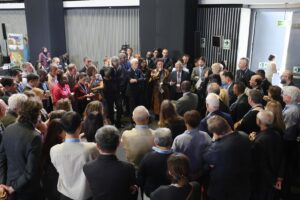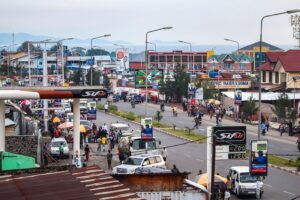
Analysis: IPCC’s seventh assessment has record-high representation from global south
Ayesha Tandon
09.16.25Ayesha Tandon
16.09.2025 | 3:31pmThe upcoming assessment cycle of the Intergovernmental Panel on Climate Change (IPCC) will be authored by more experts from global south institutions than ever before, Carbon Brief analysis finds.
More than 660 scientists from 90 countries have been selected to write the three “working group” reports that will form the core of the IPCC’s seventh assessment cycle (AR7).
These three reports are scheduled to be published by 2029 and will summarise the latest research on climate change.
Carbon Brief analysis finds that a record 42% of authors of these upcoming reports are based at institutions in the global south.
Overall, the AR7 working groups will have an equal 50-50 representation of authors who are citizens of the global north and global south.
The analysis shows that the UK has the highest number of authors at 59, followed closely by the US with 55.
Furthermore, Carbon Brief finds that 46% of the report authors are listed as “female” – the second-highest percentage to date for any group of IPCC reports.
In a statement, IPCC chair Prof Jim Skea said the new author teams “reflect increased diversity, in terms of both gender balance and greater representation from developing countries and economies in transition”.
Countries
Earlier this year, Carbon Brief published an analysis of the gender and country of affiliation of the authors of all major IPCC reports, from the first assessment report in 1990 to the sixth assessment report (AR6) in 2023, including working group reports, special reports and methodology reports.
Carbon Brief has now expanded the analysis to include the authors of the AR7 working group reports, which are expected to be published by 2029.
For scientists to become IPCC authors, they must nominate themselves or be nominated by someone else to their country’s “national focal point”, which is often the country’s ministry of environment, climate change or meteorology. It is the focal point’s job to assess the applications and send a subset to the IPCC for their consideration.
The final decision on authors lies with the IPCC bureau – which consists of the chair and vice-chairs, as well as a pair of co-chairs for each working group.
The IPCC’s seventh assessment cycle will feature three working group reports:
- Working Group I (WG1): The physical science basis
- Working Group II (WG2): Impacts, adaptation and vulnerability
- Working Group III (WG3): Mitigation of climate change
Across the three working groups, Carbon Brief finds that 42% of the authors are affiliated with institutions in global south countries. This is a record high for any set of IPCC assessment reports.
The chart below shows the percentage of global south authors from every set of IPCC reports ever published.

Each IPCC assessment cycle is marked by the publication of three working group reports, which are summarised in a synthesis report. Carbon Brief has grouped these four reports under the headline “assessment reports” for every assessment cycle.
(“AR7” includes only the three working group reports, as the author list for the synthesis report has not yet been released.)
The first, second and third assessment reports are indicated by the acronyms FAR, SAR and TAR. Subsequent assessment reports are indicated by AR, followed by the name of the assessment cycle.
Most assessment cycles also saw the publication of “special reports”, focusing on specific areas of climate change, and “methodology reports” – technical documents that focus on specific areas of the IPCC’s methodology. Acronyms for these reports are given as SR and MR, respectively, followed by the name of the assessment cycle.
For example, the special reports on 1.5C, the ocean and cryosphere and climate change and land – published over 2018-19 – are part of the sixth assessment cycle and are referred to collectively as SR6.
(To assign each special and methodology report to an assessment cycle, Carbon Brief assumes that assessment reports are the last documents to be published in each assessment cycle. Carbon Brief has grouped the authors from special reports (“SR”) and methodology reports (“MR”) separately for each assessment cycle.)
Carbon Brief defines the global north as North America, Europe, Japan, Australia and New Zealand. It defines the global south as Asia (excluding Japan), Africa, Oceania (excluding Australia and New Zealand), Latin America and the Caribbean.
While the three AR7 working group reports collectively have the highest percentage of global south authors compared to other similar groupings, there are individual reports with higher percentages, such as the 2019 special report on land and 2023 synthesis report.
Carbon Brief finds that, with 59 appointed authors, the UK is the most highly represented country in the upcoming IPCC working group reports.
This is closely followed by the US with 55. Rounding off the top five are Australia, Germany and China, with 34, 32 and 29 authors each, respectively.
Comparing the number of authors in each continent shows Europe with comfortably the largest representation, at more than 200 appointed authors. At the other end of the scale, South America and Africa have the fewest authors, with around 80 and 70 authors, respectively.
Of these three reports, WG2 has the highest percentage of global south authors for the IPCC’s seventh assessment cycle, while WG1 has the lowest.
Institutions
Each author is listed on the IPCC website with their affiliated institution or institutions.
Carbon Brief has tallied up the total number of authors for each institution.
Where an author has listed a specific department or institute, Carbon Brief has counted the parent organisation. For example, the “Met Office Hadley Centre” is counted as the “UK Met Office”. Similarly, where a university has multiple centres or is part of a system of universities, such as “University of California, Santa Barbara” and “University of California, San Diego”, they are counted together (“University of California”).
(Note, there may be instances where the IPCC has not listed all the affiliations for an author and so these totals may not match exactly with counts publicised by individual institutions.)
Below, Carbon Brief has ranked the 19 institutions that have at least five AR7 authors.
| Institution | Country | Number of authors |
|---|---|---|
| CGIAR | International | 13 |
| Imperial College London | UK | 11 |
| University of Cape Town | South Africa | 10 |
| National Centre for Scientific Research | France | 9 |
| Potsdam Institute for Climate Impact Research | Germany | 8 |
| University of the West Indies | International | 7 |
| International Institute for Applied Systems Analysis | International | 7 |
| University of Melbourne | Australia | 6 |
| University of Oxford | UK | 5 |
| University College London | UK | 5 |
| National Institute for Environmental Studies | Japan | 5 |
| University of California | US | 5 |
| King Abdullah Petroleum Studies and Research Center | Saudi Arabia | 5 |
| CICERO Center for International Climate Research | Norway | 5 |
| China Meteorological Administration | China | 5 |
| European Commission | International | 5 |
| University of Tokyo | Japan | 5 |
| Euro-Mediterranean Center on Climate Change (CMCC) | Italy | 5 |
| UK Met Office | UK | 5 |
With 13 authors, CGIAR has the largest number of authors in total. CGIAR is a global partnership working towards, it says, a “food-secure future dedicated to transforming food, land, and water systems in a climate crisis”. It is a network of research centres and includes, for example, the International Water Management Institute (IWMI) and the International Institute of Tropical Agriculture (IITA).
With 11 authors, the UK’s Imperial College London – where IPCC chair Prof Jim Skea worked for almost a decade – comes second, followed by South Africa’s University of Cape Town with 10.
Next is the French National Centre for Scientific Research with nine authors and then the Potsdam Institute for Climate Impact Research with eight.
Notably, the King Abdullah Petroleum Studies and Research Center in Saudi Arabia has five authors.
When Carbon Brief carried out similar analysis in 2018 for the IPCC’s sixth assessment cycle, the US led the pack with 74 out of the 721 authors and the National Oceanic and Atmospheric Administration (NOAA) had eight authors in total.
This year, the most highly ranked US institution is the University of California with five authors.
Only one author from NOAA was listed. This expert’s listing for “institution” specifies “until April 30, 2025 – then retired”.
This comes after disruption to the usual US federal nomination process for selecting IPCC authors.
In February, Donald Trump pulled the US out of a meeting in China to discuss the seventh IPCC assessment cycle, according to Earth.org. The outlet adds that he also ordered federal scientists at the NOAA and the US Global Change Research Program to stop work on all other IPCC climate assessment-related activities.
Citizenship and institution
IPCC authors have two countries listed next to their names – “country” and “citizenship”. For this analysis, Carbon Brief uses the former, which indicates the country where the scientist works, because citizenship data is not available in earlier reports.
However, there are dozens of experts with different countries listed under “country” and “citizenship”.
For example, 59 authors have the UK listed as their “country”, meaning that they work at institutions in the UK. However, 28 of these experts are citizens of other countries, including Kenya, Chile and Spain.
Of the 29 authors with Indian citizenship, nine are registered with institutions in other countries, including Nepal, Malaysia and the UK.
Meanwhile, 13 authors are registered with institutions in Saudi Arabia – including an employee from the oil company Saudi Aramco – but only five have citizenship there.
Carbon Brief finds that a record-high 280 experts are affiliated with institutions in the global south, making up 42% of total authors.
(While half of all authors are citizens of global south countries, citizenship information is not provided with all IPCC reports and so a full comparison throughout IPCC history is not possible.)
IPCC scientists previously told Carbon Brief that experts from the global south often find it easier to apply to join the IPCC via institutions in the global north.
Gender
The IPCC provides binary gender data for all the AR7 authors.
Carbon Brief finds that 46% of the authors of the IPCC’s seventh assessment working group reports are listed as women.
The chart below shows the gender balance of the authors of all IPCC reports ever published.

Of the three AR7 reports, WG2 has the highest proportion of authors who are women.
Just shy of 52% of the authors of the impacts, adaptation and vulnerability report are women, making it the IPCC report with the second-highest proportion of women authors, after the IPCC’s upcoming special report on cities with 53%.
Methodology
Carbon Brief downloaded authorship data on the AR7 working group reports from the IPCC website, which lists data on each author’s gender, citizenship and the country where their institution was based. Carbon Brief also obtained data from the IPCC’s technical support unit.
(The “methodology” section of Carbon Brief’s earlier 2025 and 2023 on IPCC authorship contains more details on how Carbon Brief collected authorship data from the main working group reports and recent special reports.)
Carbon Brief recognises that gender is not best categorised using a binary “male” or “female” label and appreciates that the methods used of determining author gender could result in inaccuracies. However, for the purpose of this analysis, this method was deemed suitable.
This article was updated on 18 September 2025 to revise the author counts for institutions. It was also updated on 13 October to clarify that the University of California is a system of universities.





